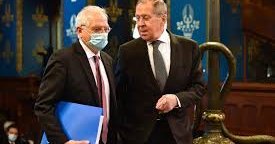Prior to flying to Moscow, Borrell himself acknowledged that his trip, the first of any EU High Representative for Foreign Affairs to the Russian capital in over three years, was “controversial” and opposed by several EU members. Walking into a fraught environment shaped by Russia’s poisoning and imprisoning of anti-corruption activist Alexei Navalny and widespread arrests of protesters, not to mention deep division among EU members and partners like Ukraine about the Nord Stream 2 pipeline, Borrell sought, in his own words, to “address, through principled diplomacy, the process of a rapid worsening of our relationship with Russia.”
If only it were that easy.
During his meeting with Russian Foreign Minister Sergei Lavrov, Borrell learned (via Twitter, apparently), that Russia was expelling German, Polish, and Swedish diplomats for supporting the Navalny-related protests. He was then humiliated at a joint press conference, in which his host called the EU an “unreliable partner,” accused the bloc of lying about the Navalny case and baited Borrell into criticizing the US’ Cuba policy after a question from Sputnik, a Russian state-owned media outlet.
The unified criticism of Borrell from across the fragmented political spectrum is especially notable. One MEP lamented the fact that Borrell was “figure dancing” during an ice hockey match. Another asked Borrell, in his native Spanish, “¿Dónde están los cojones de la Unión Europea?” Over 70 others sent a letter to European Commission President Ursula von der Leyen, blasting the envoy’s “failure to stand for the interests and values of the European Union.”
Outside commentators remarked that in going on this “fool’s errand,” Borrell suffered “a brutal, calculated public humiliation” and brought about a “low point in the so-far largely undistinguished history of the EU high representative for foreign policy.” A Politico Europe story titled “EU foreign policy RIP” painted an especially morbid picture, declaring that “European foreign policy died in Moscow.” All that is left now is a sea burial in the Baltic, where the final section of Nord Stream 2 is being laid, it concluded mordantly.
Of course, EU divisions are not Borrell’s fault. He cannot be expected to bridge the gap between German President Frank-Walter Steinmeier’s mystifying invocation of Soviet deaths in World War Two as justification for continuing with Nord Stream 2 and Polish Prime Minister Mateusz Morawiecki’s portrayal of the pipeline as an “anti-Union project that could soon serve Russia’s aggressive politics.”
Indeed, the “dead-end pragmatism” of Germany, the EU’s most powerful member in its dealings with Russia means that the bloc “has nothing to offer and nothing to threaten” so long as Berlin maintains that “change can be achieved through trade.” Again, Borrell cannot be expected to alter this reality.
What he can be expected to do, however, is not stumble into scenarios in which that internal division is not laid bare for the rest of the world to see. Yet this was precisely what he did in going to Moscow.
The EU has troubles enough, most immediately with its halting vaccine distribution roll-out, for it to expose itself in this way. Russia has repeatedly called the bloc’s bluff on its decades-long quest to be taken seriously as a foreign policy actor, and as Borrell’s visit indicates, the Kremlin is winning that bet.
In going to Moscow, the high representative got a graduate degree in international relations, complete with a strong experiential education component. Yet it is not him who will be paying tuition.
That tuition will be billed to Russian citizens subject to arrest for attending peaceful protests, people whose lives and futures are, in the EU’s eyes, not worth risking commercial interests and the possibility of diplomatic niceties. Russia has long suspected this to be the case, and Borrell’s visit simply confirmed that suspicion.
But this need not be the case.
Russia is a member of the Council of Europe and of the European Convention on Human Rights, so its rights violations are “the business of all Europeans.” Armed with the “moral self-confidence” that some EU states have taken to their relations with China, the bloc could actually use its economic weight to try to alter Russian behavior. Ultimately, as Borrell hopefully has learned, foreign policy is about “trying to get some country to do what you want,” not just giving joint press conferences.
Hopefully, the next time Borrell or a successor travel to Moscow, EU members will allow the representative to pack the proper ice skates, ensuring that the block will not be left doing unconvincing Biellmann spins while the Russians shoot a puck into an empty net.

Follow the comments: |
|
